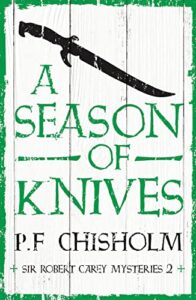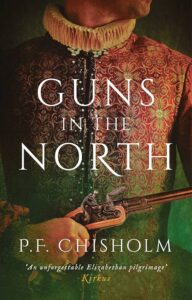Sir Robert Carey is the very model of an Elizabethan courtier; he has skills equestrian, pedestrian and deductional. He’s met the Queen of England and he’s won the fights he chronicles, in England and in Scotland, and some in Lands Debatable. He’s well acquainted, too, with matters barely ethical; he understands corruption, both the venal and the gentry’s style.
Chisholm begins A Season of Knives with a character suffering from what modern readers will recognize as allergies, but which his wife thinks is something between laziness and dissipation. At any rate, his condition keeps Long George Little away from making hay — even after sundown — and in the streets of Carlisle, where a shortcut in down an alley turns out to be fateful for a surprisingly large number of people. Not least Sir Robert, who is nowhere near the alley at that time, being engaged in an evening of cards in Carlisle Castle, with his brother-in-law the Warden of the Western March, with his mortal enemy Sir Richard Lowther, and with various other members of the city’s highest society.
Long George discovers several of his cousins lying in wait in the alley. They have been hired by one Jemmy Atkinson to deliver a beating and a warning to Andy Nixon, who has been cuckolding Atkinson. They take care not to kill him, but leave him in the alley mud, hurt and unable to stand. Unfortunately for nearly everyone except Nixon, Carey’s servant Barnabus discovers him in the alley and, having pity, drags him through the doorway Nixon had been crawling toward. Being not entirely reformed from his London ruffian days, Barnabus takes the opportunity to cut Nixon’s purse.
Unfortunately for practically everyone in the story, some time between paying off his hirelings for beating up Nixon and late the next morning, Jemmy Atkinson is murdered, his throat slit nearly from ear to ear.
Exactly when and where, and especially by whom, form much of the matter of A Season of Knives. Carey almost does not get a chance to seek the truth of the matter for two reasons. First, his servant Barnabus is the prime suspect: one of his knives is found on the victim’s body. Sir Robert is suspected of ordering the killing, and possibly also participating, with this theory supported by the presence of one his gloves also on the body. Only the Warden’s personal estimation of his character prevents his immediate arrest, and the Warden makes it clear that the cloud of suspicion has not abated. Second, Carey has to ride out of Carlisle because he has gotten wind of a plot to kidnap Elizabeth Widdrington, lately a guest at the Castle and the closest to a true love that Carey has yet found. The patrol he is set to lead are mostly his enemy Lowther’s men, so he must find a way to prevent Elizabeth’s capture without himself falling victim to a treacherous stroke in the melee.
A Season of Knives retains the virtues of A Famine of Horses: it moves forward at a furious pace; the people in and around Carlisle are all tied to one another — no motives are simple and every action has repercussions; and Carey is slowly but surely coming to belong on the Marches. He is still a courtier from the south for many people in the story, but for others, he is sensitive to the relations among the families of the borderlands, and he is not afraid of the hard work that’s part of any agricultural society. If anything, the action may be a little too fast. This book begins the day after its predecessor, but the characters in A Season of Knives make practically no reference to events that had taken place just days before. That’s good for making a novel self-contained, but not really the way that people tend to act. The other niggle I have is that a fair amount of the action takes place at night or just before dawn. That wouldn’t be a problem except that Carlisle is at nearly 55° north latitude, and the novels are set in early July. The sun crosses the horizon at about 3:40am at that date and place (4:40am in modern times with daylight savings time), and true nighttime darkness is in very short supply.
Aside from movements astronomical, Chisholm juggles characters, connections and action with aplomb. Nearly everyone has a hand in at some point. Sergeant Dodd discovers more about his troop’s leader, who is still sometimes naive about Border danger, and even cracks a smile or two. The women of town and castle show themselves more than a match for the men. Money talks, blood flows, but will justice be done? I couldn’t wait to find out, and read the book within a day.
+++
I read A Season of Knives as part of the omnibus volume Guns in the North, which is more readily available these days. Its story begins the day after the end of A Famine of Horses. The next book in Sir Robert Carey’s story is A Surfeit of Guns, and it starts about twenty-four hours after the end of A Season of Knives. It’s a busy couple of weeks in Sir Robert’s life. I suppose you could start with the middle book of an omnibus edition, but why? Begin at the beginning.



1 ping
[…] Surfeit of Guns picks up the afternoon of the day after the end of A Season of Knives; P.F. Chisholm gives her protagonist Sir Robert Carey no time to rest. In fact, she sends him off […]